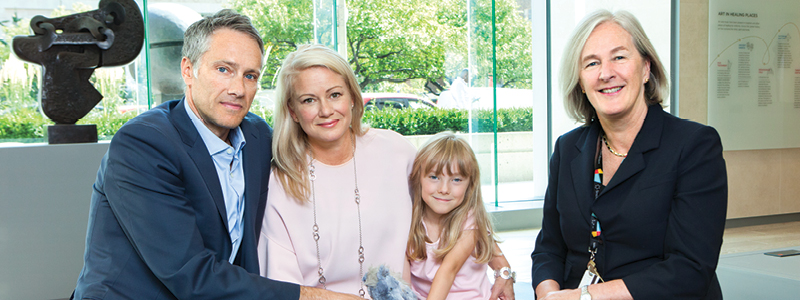
 Above: The Hourigan Family and Dr. Karel O’Brien
Above: The Hourigan Family and Dr. Karel O’Brien
Back in 2011, Jacqueline (Jack) and her partner Andy were the first participants in a new model of Neonatal Intensive Care Unit (NICU) care — called Family Integrated Care (FICare) — being tested at Mount Sinai's Newton Glassman Charitable Foundation NICU. Under FICare, parents learn to be involved in all aspects of their child’s care, including feeding, tracking growth and progress, taking part in medical rounds, and much more. The principle of FICare is that families should be supported, educated and empowered to provide as much of their infants’ care as they are able.
“We were so happy when Tess was born but nothing could have prepared us for the shock of being thrust into such a clinical world,” says Jack. “FICare enabled us to become an integral part of our daughter’s medical team.”
FICare has its roots in Estonia, where a shortage of NICU nurses in 1979 prompted the implementation of a model whereby parents provide everything but the most advanced medical care for their preterm infants, with support from the medical team. This model produced healthier babies and shorter NICU stays.
Impressed by the results from a country with a significantly smaller health budget and far fewer resources than those available in Ontario, Dr. Shoo Lee, Mount Sinai’s paediatrician-in-chief, Dr. Karel O’Brien, a Mount Sinai staff neonatologist, and others travelled to Estonia in 2010 to observe the model in action. They returned and worked with a multidisciplinary team at Mount Sinai — including veteran NICU parents — to develop FICare, which was then tested in the small pilot study that included Jack and Andy.
Led by Drs. Lee and O’Brien, both of whom are also clinician-scientists at the Lunenfeld-Tanenbaum Research Institute, the pilot study found that FICare had several benefits for infants and parents over standard NICU care. To more definitively compare the two models, they then launched an international study involving 1,700 infants at 25 NICUs across Canada and Australia. Completed in 2016, this major study reaffirmed that FICare infants gain weight faster and that their parents experience less stress and anxiety.
“Parents perform a role that nobody else can — no nurse, no doctor can do what a parent does at the bedside for their child,” says Dr. O’Brien.
FICare’s success has attracted visitors from NICUs in China, the United Kingdom and the U.S., who seek to train with Mount Sinai’s specialists in order to implement FICare at their own sites.
Meanwhile, now at six-and-a-half years old, Tess is hilarious, creative and kind. “If someone had told me in the NICU that one day my kid would be riding horses, practising yoga and crossing a stage to pick up her Montessori graduation certificate, I would have never believed them. It’s amazing to see. Our FICare education helped Tess reach goals we could have never imagined,” says Jack.
“I think the single most important thing parents need to know about Family Integrated Care is that they can do something nobody else can for their baby.”
- Dr. Karel O'Brien, Staff Neonatologist, LTRI Clinician-scientist